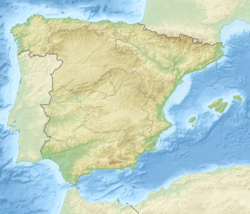Calanda, Spain
| Calanda | ||
|---|---|---|
 |
||
|
||
| Coordinates: 40°56′27″N 0°13′54″W / 40.94083°N 0.23167°WCoordinates: 40°56′27″N 0°13′54″W / 40.94083°N 0.23167°W | ||
| Country | Spain | |
| Autonomous community | Aragon | |
| Province | Teruel | |
| Municipality | Calanda | |
| Government | ||
| • Mayor | José Ramón Ibáñez Blasco (PSOE de Aragón) (2015–2019) |
|
| Area | ||
| • Total | 112.25 km2 (43.34 sq mi) | |
| Population (2015) | ||
| • Total | 3,893 | |
| • Density | 35/km2 (90/sq mi) | |
| Demonym(s) | Calandino | |
| Time zone | CET (UTC+1) | |
| • Summer (DST) | CEST (UTC+2) | |
Calanda is a town in the province of Teruel, Aragon, Spain. It lies on the southern fringe of the Ebro river basin, at the confluence of the Rivers Guadalope and Guadalopillo.
The climate is transitional between Mediterranean and Continental.
The local economy is based upon agriculture, especially the cultivation of peaches and olives, both of which have Protected Designation of Origin status: Melocotón de Calanda in the case of the peach production and Aceite del Bajo Aragón for the olive oil. Other agricultural products are almonds and other fruits as well as some cereals.
Calanda is the birthplace of Spanish film director Luis Buñuel.
Iglesia de Nuestra Señora de la Esperanza.
Templo del Pilar.
Convento del Desierto.
Los Arcos.
Arco de San Roque.
Glorieta Oliva Gasque.
El Humilladero.
Pantano de Calanda.
Camino de Albalate (1): Roman mosaic.
Camino de Albalate (2): Roman mosaic, detail.
Camino de Albalate (3): Glazed ceramic vessel.
Camino de Albalate (4): Landmark memorial.
...
Wikipedia


